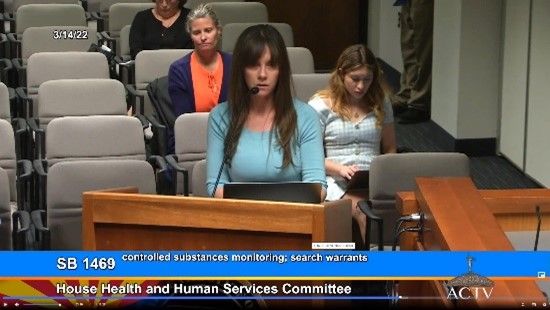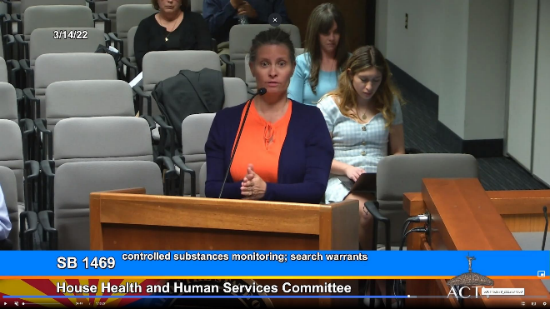Article
Signing Of Arizona SB1469 on Controlled Substances Monitoring Search Warrants, into Law by Governor Douglas Ducey
FOR IMMEDIATE RELEASE
Gold Canyon, AZ – 6/11/2022

Arizona Governor Douglas Ducey signed SB1469 info law requiring law enforcement and criminal justice agencies to provide a valid search warrant in order to access Controlled Substances Prescription Monitoring Program (CSPMP) data from the State Board of Pharmacy (Board). This law will go into effect 90 days after the end of the Fifty-Fifth Legislature, Second Regular Session wraps up.
The SB1469 was sponsored by Senator Nancy Barto and passed unanimously in both the Arizona House and Senate. There were more than 40 groups, providers and individuals signed on in support of the bill’s passage. There was a wide range of support for the bill coming from medication providers, patients, and nonprofits. The Republican Liberty Caucus of Arizona, Arizona Chronic Care Together Coalition, Arizona Psychiatric Society, Republican Liberty Caucus of Arizona, and ACLU of Arizona were helpful in their support of the bill passage. Marilyn Rodriquez of ACLU of Arizona, Dr. Jeffrey Singer of Cato Institute, and Barby Ingle pain patient & President of International Pain Foundation gave testimony, on the importance of the passage of this bill for the Arizona community.
Dr. Jeffrey Singer of the Cato Institute remained neutral on the bill during testimony, adding after the recent passage, “Law enforcement should not be able to go on a fishing expedition through patients' medical records without a warrant signed by a judge showing there is probable cause of a crime.” The state prescription monitoring program (CSPMP) is operated, monitored and maintained by the Board and includes a computerized central database tracking system to track the prescribing, dispensing and consumption of schedule II, III, IV and V controlled substances that are dispensed by a licensed or permitted medical practitioner or pharmacy.
In compliance with A.R.S. § 36-2602, the CSPMP is used to assist law enforcement to identify illegal activity related to prescribing, dispensing and consuming schedule II, III, IV and V controlled substances and provides information to patients, medical practitioners and pharmacists to help avoid the inappropriate use of such substances. The database must include data from the Department of Health Services that identifies Arizona residents who possess a registry identification card and must not interfere with the legal use of a controlled substance for managing severe or intractable pain.

The current statute (A.R.S. § 36-2604) allows the Board to release CSPMP data to a local, state or federal law enforcement or criminal justice agency upon Board suspicion of illegal conduct, or if the agency provides in writing that access to the data is necessary as part of an open investigation or complaint.
Singer said, “This new law will restore Fourth Amendment rights and due process, and will hopefully allay many doctors' fears that they risk arrest for adequately treating their patients' pain.”
The new previsions will limit the Board's ability to release CSPMP data to a law enforcement or criminal justice agencies to only circumstances in which the agency has a valid search warrant and is using the information for an open investigation or complaint. The new law allows an investigator to refer a prescriber to the applicable professional licensing board for investigation if, after reviewing CSPMP data, the investigator finds no evidence of a statutory crime but suspects the prescriber is inappropriately prescribing controlled substances in manner or amount. It prohibits the investigator from undertaking criminal proceedings or pursuing the arrest of a prescriber based on suspicion of inappropriately prescribing controlled substances. This bill also removes the requirement that the Board provide evidence of unprofessional conduct of a Physician, upon review of CSPMP data, to a law enforcement or criminal justice agency. The bill allows an investigator to refer a prescriber to the applicable professional licensing board for investigation if, after reviewing CSPMP data, the investigator finds no evidence of a statutory crime but suspects the prescriber is inappropriately prescribing controlled substances in manner or amount. Finally, the bill prohibits the investigator from undertaking criminal proceedings or pursuing the arrest of a prescriber based on suspicion of inappropriately prescribing controlled substances.





